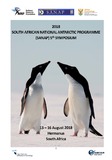
Antarctic Legacy Archive
Invasive sub-Antarctic grasses respond to increasing temperatures at the expense of chilling tolerance
- ALSA Home
- →
- Documents
- →
- Research Events
- →
- View Item
JavaScript is disabled for your browser. Some features of this site may not work without it.
| dc.contributor.author | Ripley, B.S. | |
| dc.contributor.author | Edwardes, E. | |
| dc.contributor.author | Rossouw, M. | |
| dc.contributor.author | Smith, V.R. | |
| dc.contributor.author | Midgley, G.F. | |
| dc.coverage.spatial | sub-Antarctic | |
| dc.coverage.spatial | Marion Island | |
| dc.date.accessioned | 2021-03-05T15:52:51Z | |
| dc.date.available | 2021-03-05T15:52:51Z | |
| dc.date.created | 18-Aug | |
| dc.date.issued | 18-Aug | |
| dc.identifier.uri | http://hdl.handle.net/123456789/28447 | |
| dc.description.abstract | Climate change and global warming has large effects on the performance and spatial distribution of plants and is considered one of the underlying causes for the spread of invasive species. Particularly vulnerable is the vegetation in cold environments where plants selected for tolerance traits have reduced phenotypic plasticity and capacity to respond to warming temperatures. In contrast, invasive species are phenotypically plastic and respond positively to climate change at the expense of stress tolerance. We investigate this trade-off in traits measuring the photosynthetic response to warming, chilling tolerance and specific leaf area (SLA. of a phylogenetically constrained group of Pooid grasses. We correlate this to the extent to which their ranges have expanded on a cold Sub-Antarctic Island in the southern ocean. The invasive species responded strongly to warming, increasing photosynthetic rates by up to two-fold, while non-invasive species did not respond. The response was associated with increased stomatal conductance and not to modifications of the photosynthetic metabolism. In contrast, electrolyte leakage, a measure of chilling sensitivity, was higher in invasive than non-invasive species, and SLA followed a similar pattern. All three traits scaled linearly with the rates of range expansion and demonstrate that on a historically cold island, unprecedented warming over the last 50 years has favoured grass species that can respond to warming at the detriment of those that cannot, and negated the advantage that chilling tolerance must have conferred in the past. This shows that cold ecosystems are particularly vulnerable to warming as species selection for stress tolerance has limited their responsiveness to environmental change, while introduced invasive have no such limitations. We show clear mechanistic evidence of the physiology that underpins these warming and chilling tolerance traits. - Abstract as displayed in the - Abstract booklet. The presentation on the day may differ from the - Abstract. | en_ZA |
| dc.description.sponsorship | Sponsored by the the Department of Science and Innovation(DSI) through National Research Foundation (NRF) - South Africa | en_ZA |
| dc.description.statementofresponsibility | Antarctic Legacy of South Africa | en_ZA |
| dc.format | en_ZA | |
| dc.language | English | en_ZA |
| dc.language.iso | en_ZA | en_ZA |
| dc.publisher | South African National Antarctic Programme (SANAP. | en_ZA |
| dc.relation | SANAP Symposium 2018 | en_ZA |
| dc.rights | Copyright | en_ZA |
| dc.rights | Copyright | en_ZA |
| dc.subject | Research | en_ZA |
| dc.subject | Science | en_ZA |
| dc.subject | Meetings | en_ZA |
| dc.subject | Symposium | en_ZA |
| dc.subject | SANAP Symposium 2018 | en_ZA |
| dc.subject | Living Systems | en_ZA |
| dc.subject | Terrestrial | en_ZA |
| dc.subject | Terrestrial Science | en_ZA |
| dc.subject | sub-Antarctic | en_ZA |
| dc.subject | Marion Island | en_ZA |
| dc.subject | Flora | en_ZA |
| dc.subject | Plants | en_ZA |
| dc.subject | Invasive Species | en_ZA |
| dc.subject | Invasive Grasses | en_ZA |
| dc.subject | Climate Change | en_ZA |
| dc.subject | Plant Traits | en_ZA |
| dc.title | Invasive sub-Antarctic grasses respond to increasing temperatures at the expense of chilling tolerance | en_ZA |
| dc.type | Abstracts | en_ZA |
| dc.rights.holder | Antarctic Legacy of South Africa | en_ZA |
| dc.rights.holder | Ripley, B.S. | en_ZA |
| dc.rights.holder | Edwardes, E. | en_ZA |
| dc.rights.holder | Rossouw, M. | en_ZA |
| dc.rights.holder | Smith, V.R. | en_ZA |
| dc.rights.holder | Midgley, G.F. | en_ZA |
| iso19115.mdconstraints.uselimitation | This item and the content of this website are subject to copyright protection. Reproduction of the content, or any part of it, other than for research, academic or non-commercial use is prohibited without prior consent from the copyright holder. | en_ZA |
| iso19115.mddistributor.distributorcontact | South African National Antarctic Programme -SANAP. | en_ZA |
| iso19115.mdformat.name | en_ZA | |
| iso19115.mdidentification.deliverypoint | Antarctic Legacy of South Africa, Faculty of Science, Private Bag X1, Matieland. Stellenbosch. South Africa. | en_ZA |
| iso19115.mdidentification.electronicmailaddress | antarcticlegacy@sun.ac.za | en_ZA |
| iso19115.mdidentification.organizationname | Rhodes University | en_ZA |
| iso19115.mdidentification.organizationname | Stellenbosch University | en_ZA |
Files in this item
This item appears in the following Collection(s)
-
Research Events [502]
Material directly related to official scientific and research events
